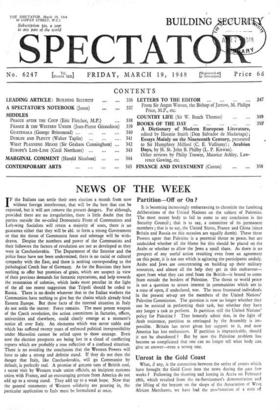Partition—Off or On ?
It is becoming increasingly embarrassing to chronicle the fumbling deliberations of the United Nations on the subject of Palestine. The most recent body to fail to come to any conclusion is the Security Council ; that is to say, a committee of its permanent members ; that is to say, the United States, France and China (since Britain and Russia on this occasion are equally dumb). These three Powers agree that Palestine is a potential threat to peace, but are undecided whether all the blame for this should be placed on the Arabs or whether to allow the Jews a small share. As there is no prospect of any useful action resulting even from an agreement on this point, it is not one which is agitating the participants unduly. Arabs and Jews are concentrating on building up their military resources, and almost all the help they get in this endeavour— apart from what they can steal from the British—is bound to come from outside the borders of Palestine. The threat to world peace is not a question to arouse interest in communities which are in a state of open, if undeclared, war. The most frustrated individuals in the present set-up are the members of the United Nations' Palestine Commission. The question is now no longer whether they can be assisted in performing their task, but whether they have any longer a task to perform. Is partition still the United Nations' policy for Palestine ? They honestly admit that, in the light of Arab resistance, partition as envisaged by the Assembly is im- possible. Britain has never given her support to it, and now America has lost enthusiasm. If partition is impracticable, should it not be abandoned ? But by now the Palestine problem has become so complicated that one can no longer tell what body can give an answer—even a wrong one.






























